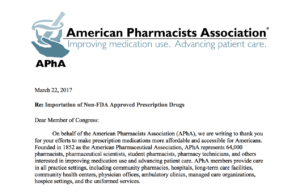The American Pharmacists Association Writes Congress to Oppose Importation
 On March 22, the American Pharmacists Association (APhA), which represents 64,000 pharmacists, pharmacy technicians, pharmacy students and other pharmacy professionals wrote a letter to Congress opposing plans to legalize importation of non-FDA approved drugs. These proposals, they wrote, are “in direct conflict with recent efforts by Congress and federal agencies to increase the integrity and security of the U.S. drug supply.”
On March 22, the American Pharmacists Association (APhA), which represents 64,000 pharmacists, pharmacy technicians, pharmacy students and other pharmacy professionals wrote a letter to Congress opposing plans to legalize importation of non-FDA approved drugs. These proposals, they wrote, are “in direct conflict with recent efforts by Congress and federal agencies to increase the integrity and security of the U.S. drug supply.”
The APhA’s letter details the ways in which proposed legislation presents tremendous safety and implementation problems. Introducing foreign pharmacies and drug wholesalers to the American drug supply undermines the role of the pharmacist, the safety of patients, industry-wide efforts to implement the Drug Supply Chain and Security Act (DSCSA) and the United States’ state-based licensure of safe pharmacies. Furthermore, importation would increase administrative costs for pharmacists who must monitor the source of medicines and relies on an unrealistic level of oversight of foreign drug sources by the FDA and foreign regulators who have not agreed to regulate the export of medicines to the United States.
“APhA believes such policy could hurt the very patients intended to benefit from importation proposals. Consequently, the risks to patient safety from harmful or ineffective products or avoidable medication errors due to fractured care outweighs any increase in access or cost-savings.
Despite the good intentions of policymakers who offer prescription drug importation as a mechanism to help patients reduce their medication costs, APhA is concerned savings, if any, will be short-term. We worry importation will instead result in long-term costs to patients and the health care system. Furthermore, APhA is skeptical whether the intended effect of importation proposals —lower cost medications for patients —will be realized broadly. Accordingly, APhA urges Congress to oppose bills that legalize importation of non-FDA approved drugs by pharmacies, wholesale distributors, and individuals.”